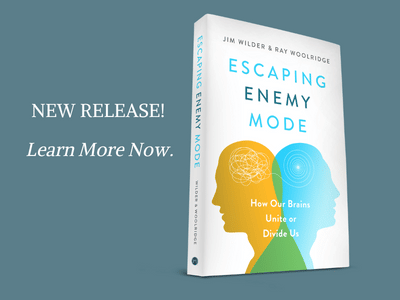Have you ever wondered why it can be hard to respond well to what others say or do? You have intentions of being loving, kind, encouraging, and then you are in a discussion and you find yourself responding with something like sarcasm, anger, or judgment instead of being a gentle responder. Let’s explore this common situation.
We learn relational skills from authentic relationships and faces that know the skills.
A gentle responder is a person who reacts kindly and tries to understand that others might be reacting out of their pain or weakness. Lately, I’ve been learning that becoming a gentle responder doesn’t start by working on how I think. It isn’t accomplished by having more information. What we need are authentic relationships with people who are gentle responders and who model relational brain skills. Information is important, but these skills are not learned from books or videos. We learn the skills non-verbally from authentic relationships and faces that already know the skills. Sometimes it can be difficult to find authentic relationships, but we must not give up the search. In this article, we will find some resources to at least give us the information that can help us recognize what kind of relationships we need in order to be gentle responders.
As we look at some resources, we can keep in mind that ideally, we learn these relational brain skills before the age of three. Unfortunately, most of us are lacking a few and we might not even know what we don’t know. Chris and Jen Coursey with Life Model Works have come up with nineteen relational skills that, when learned, make relationships flourish. Chris’ book, Transforming Relationship, details each of the nineteen skills. Here are some reasons why these skills are so vital.
The left side of our brain is all about logic and words. It actually runs more slowly than the right side which is about relating through joy. Let me give you a new definition of joy: Joy means someone is glad to be with me and it takes at least two of us to have joy. (Jesus can be the other someone!) The brain’s relational side runs faster than conscious thought, unlike the left.
The brain has a slow track and a fast track. We respond from what’s contained in the fast track.
In their book, RARE Leadership, Doctors Wilder and Warner call the relational side of the brain the “fast track” and the left side the “slow track.” Because the slow track follows the fast track, we respond to circumstances and emotions from whatever we have built into the fast track. For those of us who wish to be gentle responders to distress, conflict, or negative emotions, it is vital to train the fast track. Along with training our relational brain, we also need healing from traumas and we need to grow emotional maturity, but those are topics in other blogs.
When we are born, we are wired to be “predators” not gentle responders.
Most people I know who love Jesus and want to grow in their walk with Him want to be gentle responders and gentle protectors. But here’s the rub: When we are born, we are wired to be predators—selfish, prone to blame, self-justify, and attack—not gentle responders. The best place to learn gentle responses is in a family and community that model such responses. Since many of us lacked such modeling and failed to learn some of the relational skills, through the years we have been taught that we have to control the predatory responses with our will. We live in a world that focuses on the slow track. Thus, we grit our teeth or bite our tongues instead of becoming the kind of people inside from whom gentle responses naturally flow. Here’s an uncomfortable truth: The fast track is going to respond faster than we can choose.
In my Joy Group, we are learning to train the fast track through being glad to be together in spite of distressing emotions or circumstances while synchronizing with those around us. When we are learning to be more relational in spite of distress, it’s helpful to sit with another person when they are not OK, validate their feelings, and not try to “fix” them. That is how “glad to be together” works. Synchronizing means we are sharing energy levels and being on the same page with another person. Synchronizing is an unselfish act because we are thinking of the other and noticing what’s going on with them.
The fast track in the brain will respond with what it knows, not what we wish it knew.
Joy and synchronizing are two of the important relational brain skills that improve relationships. We help each other stay glad to be together and model what it is like us and our (God’s) people to do. As we learn this information, we have to go home and practice. We have to learn what to do with emotional pain and conflict. We have to know what it is like us and our people to do (be gentle protectors) instead of responding from an untrained predator-leaning brain. The fast track will respond with what it knows, not what we wish or hope it knows.
Most of us know that it takes about 30 days to form a new habit in the brain if we are consistent during the practice. It may take longer to learn a missing relational skill, but joy means there is plenty of grace for mistakes we make along the way. As we progress, the fast track responses diminish the strain to keep control through willpower or self-effort. We see ourselves responding as gentle protectors instead of as predators.
Here is an example of how I saw myself respond gently without “choosing” it: I was talking to a friend about a difficult situation going on in his family. I had an idea that I thought might be helpful but he did not want to hear it and he struck out at me. My instant response was different than other times in the past when a person had growled at me when I was trying to help. My response was one of praise for how he was handling it. It did not feel to me that I was trying to keep peace at all costs and I was willing to speak about the growl later if so led. It felt new. As I looked at the situation I realized my fast track had responded gently because I had been learning and training my brain to do so.









